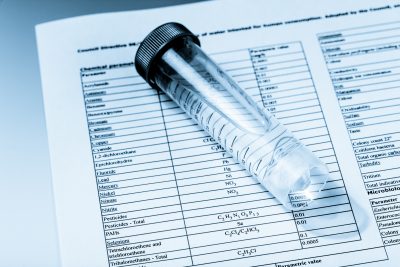How Well Water Testing can Save You Time, Stress, and Money.
Wiki Article
The 9-Minute Rule for Well Water Testing
Table of ContentsGetting My Well Water Testing To WorkThe Of Well Water TestingWhat Does Well Water Testing Do?The Greatest Guide To Well Water Testing

Federal government firms do not check or control water high quality secretive wells, and water testing is not needed by any government or state law. If you are among the 1. 7 million Georgians with an exclusive well, you are liable for the quality and safety of your well water.
Properly created and maintained water wells can provide years of hassle-free solution. Surface contaminants might get in the well if it is not correctly created and preserved, and the well might at some point weaken or come to be damaged as it gets older. Furthermore, some groundwater normally has several chemical compounds at degrees above the EPA's health-based standards, called the Optimum Pollutant Degrees (MCLs)
Check the water once yearly for total coliform bacteria, nitrates, complete dissolved solids and p, H levels. If you think various other contaminants, you must examine for those. In comparison, the quality of water in malfunctioning wells might alter suddenly and remain unnoticed as the water may look, smell and taste the same.
Unknown Facts About Well Water Testing
Minimum Screening Recommendations Well, Upkeep Annual All geographical regions Nitrates (Total Nitrate and Nitrate+Nitrite) Yearly Annual Fundamental Water Chemistry (see listed below) plus Alkalinity, Soluble Salts (or Complete Dissolved Solids), Nitrate, Chloride, Fluoride and Sulfate Initially and after that every 3 years p, H, Hardness, Aluminum Calcium, Chromium, Copper, Iron, Magnesium, Manganese and Zinc Yearly after initialcomprehensive water chemistry Extra Evaluating Suggestions Verification of Potential Contamination At least once and afterwards annual follow-up for:1) residences with pipes that pre dates the 1987 plumbing codes with copper piping with lead solders2) older houses in which there are lead pipes3) houses with brass and/or chrome fixtures (brass contains 3-8% lead; chrome fixtures contains lead) All geographicalregions A minimum of once and after that an annual follow-up Southern Coastal Plain region below the "Fall Line" on the, Georgia map At the very least as soon as and after that a yearly follow-up Piedmont-Blue Ridge areas over the "Autumn Line" on the Georgia map Volatile and Semi-volatile Organic Compounds, Chemicals, Oil Hydrocarbons and Various other Organics Not needed on a routine interval; recommended only when contamination is believed. Well Water Testing.
Examples gathered from a cooking area tap would certainly mirror the resource water buildings plus any prospective contamination from the well owner's water supply system. Tasting at the wellhead for lead is not needed, however tasting from the tap for lead would certainly More Bonuses indicate if lead solder was used in the plumbing.

The primary MCLs have been evaluated concentrations that offer a broad margin of security from unsafe wellness results for most individuals over a lifetime of alcohol consumption. Although primary MCLs are enforceable standards for PWSs only, personal well owners may choose to adhere to these criteria to shield themselves from the possible wellness danger of drinking contaminated water.
Well Water Testing - Questions
The drinking water requirement for nitrate is 10 ppm; above this degree nitrate can have negative results on human health, particularly babies under look at this now the age of six months. Chemicals are substances utilized to prevent, ruin, fend off, or minimize pests.Cyanazine breaks down in the setting into different chemicals. Some of the breakdown items of cyanazine have been identified in Minnesota water. Chemical analysis in water examples can be pricey and using particular chemicals can differ throughout the state making it difficult to understand which pesticide to analyze.
Based upon this, we suggest that you contact the MDA before sampling your well for chemicals. The cumulative or compounding health and wellness danger related to reduced levels of several chemicals in drinking water is not well comprehended at this time. Well Water Testing. As a whole, at risk populaces such as babies, youngsters, and pregnant/nursing females go to best threat
We are currently tasting wells for nitrate in areas with at risk groundwater which have substantial row plant production for nitrate as part of the Area Screening Program (TTP). More than 70,000 exclusive wells proprietors will be offered nitrate testing in over 300 municipalities. Homeowners are used a chemical examination with the Private Well Pesticide Sampling (PWPS) Job if nitrate is detected in visit here their first town testing example.
Some Known Questions About Well Water Testing.
The MDH advises utilizing a certified laboratory to test your water. To recognize a lab to have your well water evaluated, most likely to Minnesota Division of Health (MDH) Qualified Ecological Laboratories. The personalized search tab on this page permits you to look for a lab that accepts examples from personal homeowners.When possible, it is best to eliminate sources of contamination or change a contaminated water supply with a more secure supply of water instead of rely upon a home water therapy unit. Likewise, the price to evaluate for chemicals in water may go beyond the expense of a point-of-use home therapy system, such as reverse osmosis for drinking water.
If you decide to set up a home water therapy device, the unit (or systems) you select need to be certified and identified to lower or remove the compound you are worried about. If there is more than one material you want gotten rid of from your water, you may need to combine a number of treatment processes into one system.
Report this wiki page